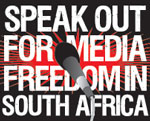
Top stories






More news


Marketing & Media
Ads are coming to AI. Does that really have to be such a bad thing?













Seconds out, round #1...
I bought tickets for a fight and witnessed a...well, I don't know what. It was a shadow boxing session, combined with a civilised fencing exercise that carried an undercurrent of maliciousness. The topics, media freedom and the Protection of Information Bill, combined to create an overall atmosphere that impending draconian legislation could lead to Zimbabwe-like media control.
Mthembu, the appointed ANC panelist, didn't pull any punches, initially - perhaps he sensed the atmosphere. In his opening flurry, he accused the print media of choosing to focus on only one aspect of a rather broad discussion document - the Media Appeals Tribunal, or MAT - in keeping with the fight analogy.
The ANC view, articulated by Mthembu, was that the discussion document is a public document and open for debate. He wondered why the media had focused on the MAT when there were more critical issues relating to media ownership and diversification, BEE and EE and spreading the media footprint to the rural areas.

His opponent didn't quite react as Mthembu expected. Perhaps it had more to do with the fact that Mthembu and Haffajee had been sparring around the topic for several days in various forums and appeared to be suffering from fatigue. While Haffajee concurred that there were issues of ownership and BEE that hadn't been addressed, she insisted that the MAT be taken off the table before any meaningful engagement could take place. Having said that, Haffajee acknowledged that the print media sector had been guilty of "peddling backwards" in terms of media ownership, BEE and employment equity issues.
Wits University Journalism chair and founding editor of M&G, Anton Harber, stepped into the fray suggesting that the ANC had to admit that there were issues that they should address at the same time, specifically around their handling of the SABC and the lack of development of the rural media networks.
Mark Weinberg, from the Alternative Information Development Centre (AIDC), wondered whether there was political will within the ANC to up the funding required by the SABC, from the current 3% to the target of 60% before the self-imposed deadline of 31 December 2010. He suggested that the state had a critical role to fill but wondered whether they could do it. He maintains that transformation is a government issue. He went further, suggesting that if government were serious they would break up the big media groupings and limit them to a set number of newspapers per city. The government had this within their power to do so.
Weinberg concurred with Harber, suggesting that the reason the ANC weren't looking at their own contribution to the current state of the SABC and the development of the rural media network probably had more to do with the ruling party's lack of political will. Weinberg wonders whether this was because it would require a fundamental policy shift, which was at odds with the ANC transformational approach.
Mthembu suggested that there should be a parliamentary investigation into the print media space, but he had every faith that any potential legislation would still have to pass through the constitutional court. Haffajee reiterated her position that it was disingenuous to have the MAT on the table and discuss how the sector could address its many challenges. Both Harber and Weinberg agreed that for any meaningful discussion to take place, the MAT should be removed.
Judging by the number of questions from the mixed audience of various media stakeholders, ranging from a self-proclaimed government "spin-doctor" to journalists and a representative from COPE, the debate has only just begun. Whether it will go all the way to an ANC-driven parliamentary investigation and a statutory body, or improved self-regulation, as the media seem to be hoping for, the underlying issues of BEE and employment equity and ownership structures will need to be resolved.
